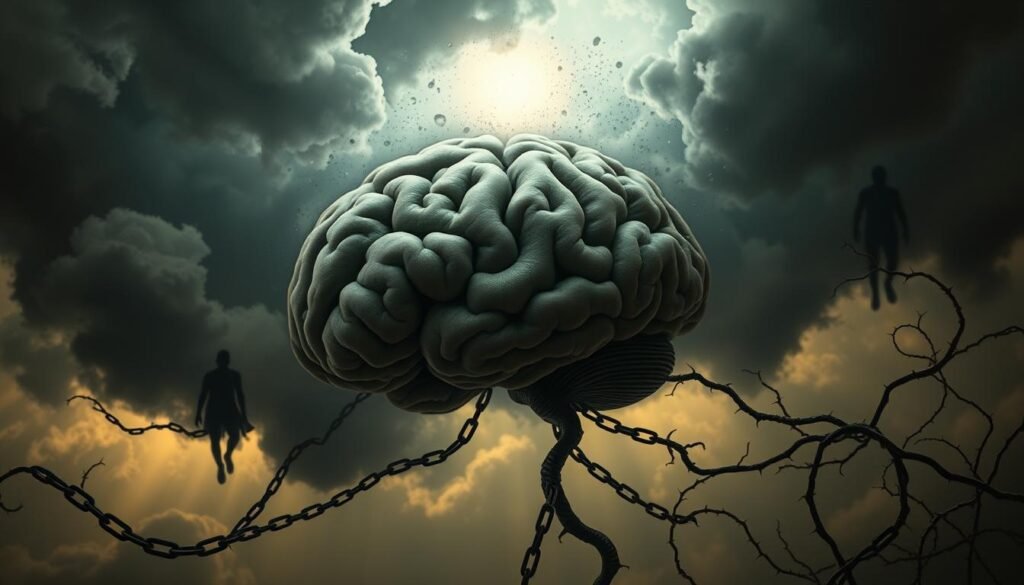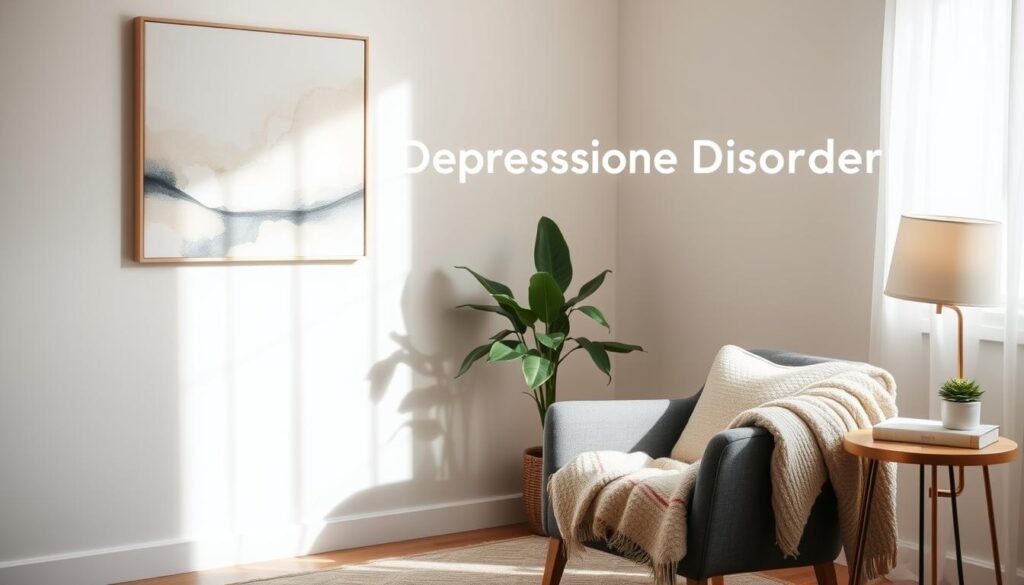Did you know that in the United States, around 21 million adults battle Major Depressive Disorder (MDD) each year? This fact shows how common this mental health issue is. It also shows why finding good ways to cope and recover is vital for those with MDD. Getting to know MDD well is key in making a support system for people wanting to beat depression.
When dealing with MDD, both the individuals and their loved ones need useful coping and recovery tips. This article will look into MDD’s symptoms, possible reasons, and effects. We’ll talk about important things like exercising, keeping up with friends, and seeing a therapist. Also, checking out resources like Alter Wellness Care can help a lot. Learning about MDD can empower people. It encourages them to actively improve their mental health.
Key Takeaways
- Major Depressive Disorder affects millions, making coping methods essential.
- Exercise is as helpful as meds for lifting mood.
- Being social can boost your mood, showing the need to connect.
- Having a regular schedule helps mental health by regulating sleep and eating.
- Therapy and support are key for the complex recovery path.
Understanding Major Depressive Disorder (MDD)
Major Depressive Disorder (MDD) deeply affects people’s lives. It shows as a lasting, deep sadness that gets in the way of everyday life. Unlike normal sadness, MDD sticks around longer, causing trouble at work, in relationships, and with general happiness.
In 2020, around 21 million adults in the U.S. had a major depressive episode. That’s about 8.4% of all adults. MDD often comes back; many go through several episodes over their lives without getting help. It’s vital to understand MDD and see how it seriously affects people of all ages and backgrounds.
There’s a clear link between MDD and genetics. Studies, like those in the Journal of Psychiatric Research, show that having family with MDD might raise your own risk. Also, hormonal changes, especially in women, can start depressive episodes at times like pregnancy or menopause.
People with substance use problems may also be more likely to experience depression. Getting good sleep is critical; not sleeping well can make you more irritable and anxious. However, regular exercise can help lower depression by increasing endorphins, says research from the Journal of Psychiatric Research.
Understanding MDD means knowing its complexity and the many ways to treat it. Being with friends and support groups can help against the loneliness that makes depression worse. Journaling is also useful for coping with bad feelings. Treating MDD is tough but knowing there are many ways to fight it is key.
Symptoms of Major Depressive Disorder
Major Depressive Disorder (MDD) impacts mental health and how well a person can function. People experience its symptoms in different ways. Some common signs include:
- Persistent sadness: A deep, lasting sorrow felt most of the day.
- Loss of interest: Activities once enjoyed no longer bring happiness, causing isolation.
- Sleep disturbances: Problems like insomnia or oversleeping disrupt daily life.
- Irritability: Mood swings and quick temper affect personal connections.
- Fatigue: A severe lack of energy makes simple tasks hard.
- Changes in appetite: This could cause major weight loss or gain.
- Feelings of worthlessness: Negative self-view or guilt are common.
In the U.S., over 20 million people suffer from depression, highlighting its commonness. To be diagnosed with MDD, symptoms must last every day for two weeks. Without proper care, these issues can persist for a long time.
MDD’s emotional and physical effects can severely restrict daily life. Recognizing these signs early is key to getting help. Treating MDD can ease symptoms and enhance wellbeing.
| Symptom | Description |
|---|---|
| Persistent Sadness | A deep, ongoing feeling of sorrow lasting throughout the day. |
| Loss of Interest | A diminished interest or pleasure in activities previously found enjoyable. |
| Sleep Disturbances | Includes insomnia or hypersomnia, affecting day-to-day functioning. |
| Irritability | Increased moodiness or frustration, impacting social relationships. |
| Fatigue | Constant exhaustion that makes even simple tasks feel insurmountable. |
| Changes in Appetite | Significant weight fluctuations due to altered eating patterns. |
| Feelings of Worthlessness | Persistent negative feelings about oneself, often accompanied by guilt. |
Impact of MDD on Daily Life
MDD greatly changes everyday life, hitting hard on things like friendships, job quality, and enjoying life. People dealing with MDD find normal tasks very hard. This creates a lot of frustration and adds to their daily struggles with depression effects.
Work quality often drops too. Being irritable, always tired, and unable to focus makes people less productive. In the US, depression causes over 200 million missed workdays each year. This leads to more than $51 billion in costs due to not being at work and not working well. So, the impact of MDD isn’t just personal. It affects coworkers and how the workplace feels too.
Depression also ruins social lives. People may pull away from friends and fun activities, getting stuck in loneliness. This can make them feel even more hopeless. Family support becomes key in these times. Seeking family therapy or group support can offer significant help. It helps those dealing with these tough depression effects.
Knowing about MDD’s effects can help families and the person affected tackle these issues better. It’s wise to avoid big decisions when feeling down, as emotions can cloud judgment. Trying self-care and enjoying nature can help. Finding ways to cope can build strength and better mental health.
It’s vital to understand how MDD changes lives. This knowledge helps to create a caring space. It ensures people with MDD feel seen and supported through their struggles. Check out more on this topic here.
Causes and Risk Factors of MDD
The causes of Major Depressive Disorder (MDD) are complicated yet interesting. They include genetics and life experiences. Having a family member with depression increases your risk. This shows how genes can affect mental health.
Brain chemistry also plays a role in the development of MDD. Changes in substances like serotonin affect our mood. These can change due to stress or big life events.
Depression often starts early, in childhood or teen years. It can last a long time, showing how early life affects our mental health.
Things like low self-esteem and negative thoughts can make depression more likely. Also, having problems like anxiety or heart disease can increase the risk. This shows how our physical and mental health are linked.
The following table summarizes key risk factors associated with MDD:
| Risk Factor | Description |
|---|---|
| Genetic Factors | Family history of depression or mood disorders |
| Environmental Stressors | Traumatic events, significant life changes, and socioeconomic status |
| Personality Traits | Low self-esteem and negative thinking patterns |
| Physical Health | Conditions such as anxiety, heart disease, and cancer |
| Substance Use | Higher prevalence of depression among individuals with substance use disorders |

Though we can’t always prevent depression, early help and resilience can make a difference. Understanding the causes and risks helps in planning better treatments, with the goal of better mental health.
Living with MDD: Coping and Recovery Strategies
People living with Major Depressive Disorder (MDD) have various ways to ease their symptoms. Personalized coping mechanisms and recovery strategies are crucial. They help manage symptoms and improve daily living.
Understanding Coping Mechanisms
Coping well with MDD is key. Regular exercise helps keep both body and mind sharp, lowering depression. Staying in touch with loved ones offers needed emotional support. Also, mindfulness or artistic activities provide a way to express oneself and ease stress. Finding what helps you the most is part of the journey with MDD.
Exploring Effective Recovery Strategies
Recovery strategies are vital for reducing depression symptoms. Having a consistent daily routine encourages healthier living. Eating well-balanced meals improves mood and physical health. Setting real goals boosts confidence through small wins. Therapy, like Cognitive Behavioral Therapy (CBT), equips people with coping skills. For more on recovery strategies, visit this resource.
Therapy Options for Managing MDD
Major Depressive Disorder (MDD) is complex, but many therapies can help manage it effectively. Different treatments cater to personal needs, helping change negative thoughts and actions.
Cognitive Behavioral Therapy (CBT) is a popular choice, aiming to shift harmful thinking towards healthier reactions. Interpersonal Therapy (IPT) focuses on improving relationships and building a support network.

Mixing psychotherapy with medicines can boost treatment success. Especially for those hard-to-treat cases, therapy can make a big difference. Patients have many psychotherapy options, like:
- Cognitive Behavioral Therapy (CBT)
- Dialectical Behavioral Therapy (DBT)
- Acceptance and Commitment Therapy (ACT)
- Interpersonal Psychotherapy (IPT)
- Family or Marital Therapy
- Group Psychotherapy
- Mindfulness techniques
- Behavioral Activation
New treatments are also on the rise. Repetitive Transcranial Magnetic Stimulation (rTMS) and Ketamine Therapy offer hope to those where standard treatments fall short. Electroconvulsive therapy (ECT) might offer quick symptom relief, although it can cause temporary confusion for some.
It’s important to find accessible therapy. Connecting with the right therapist can significantly boost the chances of successful treatment. Knowing the different therapy options and which one feels right can set individuals on a stable mental health path.
| Type of Therapy | Focus Area | Average Sessions |
|---|---|---|
| Cognitive Behavioral Therapy | Thought patterns | 20-24 weekly sessions |
| Interpersonal Therapy | Relationships | 16-20 weekly sessions |
| Behavioral Therapy | Behavior patterns | 20-24 weekly sessions |
| Mindfulness Practices | Present-moment awareness | Varies |
Medication Management in MDD Treatment
Medication management is key in treating Major Depressive Disorder (MDD). Antidepressants, like selective serotonin reuptake inhibitors (SSRIs), are often the first choice against depression. They prove effective in the initial treatment phase, offering vital support as people work towards recovery.
There are many types of antidepressants, each with different effects and side effects. SSRIs, such as fluoxetine, are popular for their safety and fewer severe side effects. In contrast, tricyclic antidepressants (TCAs), like imipramine and amitriptyline, are used in more serious cases due to their stronger side effects.
For those who find SSRIs ineffective, other options are available. Serotonin-norepinephrine reuptake inhibitors (SNRIs) like venlafaxine and duloxetine can be alternatives. Bupropion and mirtazapine are examples of atypical antidepressants, offering unique benefits.
Choosing the right medication requires close cooperation with healthcare providers. Finding the best fit might involve trying different medicines or combinations. Genetic testing can help determine how someone might react to certain antidepressants.
Sticking to the prescribed medication plan is essential. Quitting antidepressants suddenly can cause withdrawal symptoms and make depression worse. It’s important to communicate openly with healthcare providers, especially for pregnant or breastfeeding individuals, due to potential risks to the baby.
Managing medication is crucial, especially since depression is predicted to lead to major disability worldwide by 2030. Access to appropriate medications and support can greatly improve quality of life.
Self-Care Strategies to Alleviate Symptoms
Using self-care strategies is key in handling Major Depressive Disorder (MDD) symptoms. A regular routine gives structure, fighting fatigue and low motivation. It brings a sense of achievement, improving mood and promoting daily task engagement.
Importance of Routine and Structure
Having a daily routine is crucial for mental health. It creates a schedule that’s predictable, offering comfort. Activities can be simple, like:
- waking up and going to bed at the same time
- allocating time for meals
- incorporating exercise into the day
- designating periods for relaxation and hobbies
This regularity eases symptoms and encourages a healthy lifestyle. Adopting these habits helps build a balanced life. For MDD sufferers, exploring self-care strategies can make a big difference.
Healthy Eating and Its Role in Depression
What you eat greatly affects your body and mind. Eating well supports overall health and manages mood swings. Some foods provide key nutrients for mental health, including:
| Food Group | Key Nutrients | Benefits |
|---|---|---|
| Fruits and Vegetables | Vitamins, Antioxidants | Boosts immune function, enhances mood |
| Whole Grains | Fiber, B Vitamins | Improves digestion, stabilizes energy levels |
| Lean Proteins | Omega-3 Fatty Acids | Supports brain health, reduces inflammation |
| Nuts and Seeds | Healthy Fats, Minerals | Enhances mood stability and cognitive function |
Adding these foods to your diet supports a healthier mind and reduces depression effects. Balancing healthy eating with routine care is essential for handling MDD.

Building a Support System
A strong support system is key for those with Major Depressive Disorder (MDD). Friends and family provide emotional support, helping through hard times. Joining support groups also helps, sharing experiences can bring comfort and make you feel less alone.
Engaging with Friends and Family
Friends and family are crucial for people dealing with depression. They offer empathy and understanding, which helps a lot. Here are some ways to connect with loved ones:
- Open Communication: Being open about your thoughts and feelings helps others do the same. It creates a stronger bond.
- Check-Ins: Checking in regularly shows you’re not alone. It’s reassuring.
- Participating in Activities: Doing fun things together can boost moods and spark joy.
Finding Support Groups
Support groups are a safe space for MDD individuals. They offer a place to share stories and find peer support. Here’s what to look for in a support group:
- Peer Facilitator Training: A good group leader has the right skills and knowledge. This improves the group experience and offers valuable advice.
- Shared Experiences: Knowing you’re not alone, and that others understand your struggles, is comforting.
- Online and In-Person Options: Both have benefits. Online groups give anonymity, and in-person groups build stronger bonds.
Lifestyle Changes for Better Mental Health
Changing your lifestyle can greatly improve your mental health. This is especially true for those with Major Depressive Disorder (MDD). Adding exercises to your daily life and practicing mindfulness can significantly boost your well-being.
Incorporating Exercise into Daily Life
Exercise has many benefits for mental health. Studies show that being active for just 20 minutes, three times a week, can uplift your mood and energy. Whether it’s walking, yoga, or playing sports, these activities release feel-good chemicals in the brain. People who exercise often are likely to see their mental health improve.
- Regular physical activity can help fight depression and anxiety.
- Exercise promotes healthy sleep, which is vital because many depressed people struggle with sleep issues.
- Keeping track of your exercise progress can motivate you and make you feel good about your achievements.
Mindfulness and Meditation Techniques
Adding mindfulness and meditation to your daily routine can really help your mental health. Techniques like deep breathing and guided meditations are effective for handling stress. They also improve your emotional state.
- Having relaxation practices helps clear your mind and feel peaceful.
- Mindfulness keeps you focused on the present, easing worries about the past and future.
- Building a plan to manage stress, with journaling and support from friends, boosts your ability to cope.
Conclusion
Living with Major Depressive Disorder (MDD) means dealing with tough emotional and mental challenges. But, there are good strategies for coping and recovery. These strategies can really change someone’s path to getting better.
It’s important to know about MDD, see its signs, and get help from a professional. Also, taking care of yourself helps a lot in fighting depression’s effects. Doing things that make you feel better is key.
Looking into ways to keep your energy up when you’re down is helpful. The website immune-vitality.com has tips to help with tiredness. It shows people with MDD how to improve their life.
A full approach to getting better is really important. Understanding how support from others, healthy habits, and good coping ways help is crucial. The road might be tough, but with the right help and friends, getting better is possible.